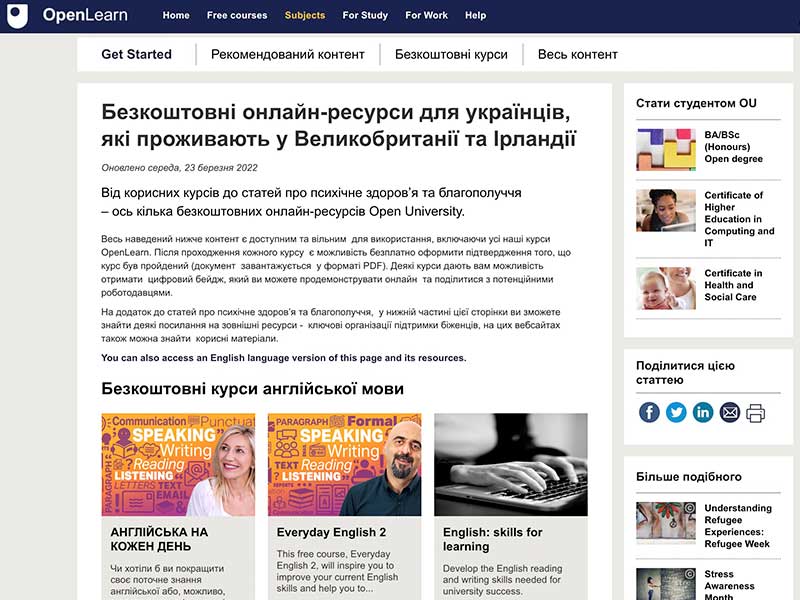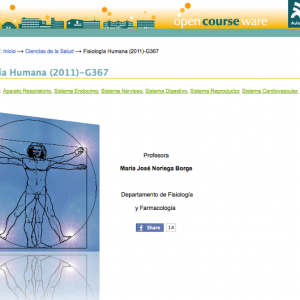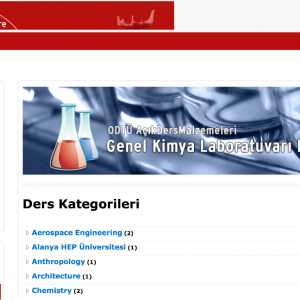The OpenLearn team was shocked by the Russian invasion of Ukraine in February 2022 and turned its thoughts towards how it could leverage its resources to support those forced to flee due to the conflict. The team analysed the learning resources that Ukrainians were using on OpenLearn to gain insight into what they had been, and were now, studying. Data showed that learning preferences of Ukrainians visiting OpenLearn prior to the Russian invasion were no different to the site’s overall analytics in terms of the popularity of certain subjects. However, from the point of the invasion, Ukrainian learners rapidly switched to studying language learning courses (English, French and German) and those relating to workplace skills.
In response to this the OpenLearn team established a project to curate and promote a set of resources for Ukrainian refugees based on these needs and on feedback sought from the OU Government Affairs team.
In April 2022 Free online resources for Ukrainians settling in the UK and Ireland was launched. The collection included practical courses on English, German and French language; additional work and study skills courses and content; mental health and wellbeing support; plus external links to key refugee support organisations.
The host collection page was promoted by numerous Open University (OU) and OpenLearn channels and has seen more than 108,000 visits to the resources to date.
Such was the initial interest in the content – it was OpenLearn’s seventh most popular page upon its introduction – that the OpenLearn team was moved to further develop the project, with key courses among the collection being translated into Ukrainian. The majority (73%) of visitors to the resources were in the UK, but the nation with the second most visitors was still Ukraine, which helped confirm OpenLearn’s belief that there was a need for Ukrainian language content to better support these learners. By interrogating platform metrics, we were able to see that the majority of these learners were accessing the materials via a mobile device (65% compared to 39% for OpenLearn overall), substantiating our fears that many were forced migrants.
Work began on translating the first courses into Ukrainian and, in October 2022, the new collection was launched — Безкоштовні онлайн-ресурси для українців, які проживають у Великобританії та Ірландії. This included a Ukrainian language introduction and explanation of the resources, course categorisations and links, as well as seven fully translated resources.
This commitment to supporting displaced Ukrainians has allowed OpenLearn to support more than 5,000 people with these translated resources, and they have been well received by those supporting Ukrainian refugees.
OpenLearn is still seeking partners to allow for the further translation of more materials. In addition, at this time, a free online course for people housing, caring for or working with Ukrainians in the UK was launched on OpenLearn.
‘Introduction to Ukrainian language and culture’ was developed to help UK residents hosting refugees, and service providers working with people who have arrived from Ukraine. Also hosted on OpenLearn, it provides an insight into Ukrainian language, food, housing and healthcare as well as other cultural elements, and offers learners the chance to chat in the forums provided and find out more about supporting Ukraine’s struggle and other Ukraine-related topics.
Flyers and posters about these resources have been made widely available, and most recently were requested for the Ukraine Refugee Arrival Hub at Luton International Airport in the UK, which the team was happy to provide.
The speed of the response, and the commitment from the OpenLearn team and OU academics to deliver these resources, particularly the translated materials and the course to support those caring for Ukrainian refugees, has been outstanding.
Award Nominator
The OpenLearn team’s initiative to support Ukrainian refugees is undeniably deserving of recognition. Their rapid response to the crisis and their commitment to helping those in need have been outstanding. By analyzing data and identifying the specific learning needs of the Ukrainian learners, the team curated and promoted a valuable collection of resources, including language courses, workplace skills, mental health support, and links to refugee organizations. Their dedication to continuing and expanding this support for all displaced nationals worldwide showcases the true worthiness of this nomination.
Award Reviewer



